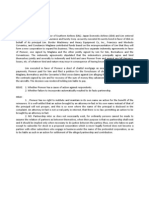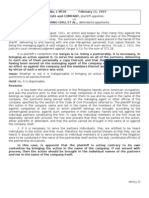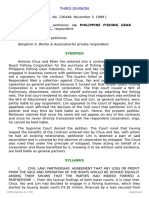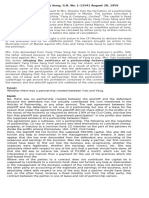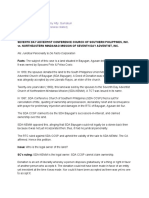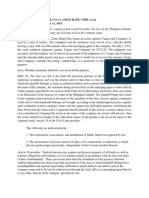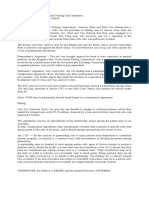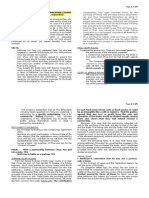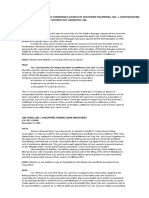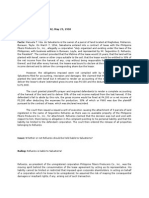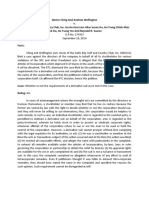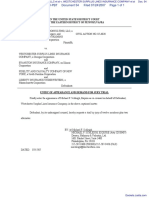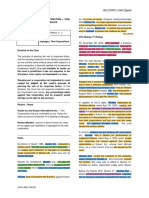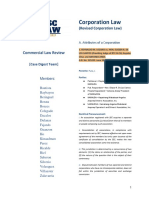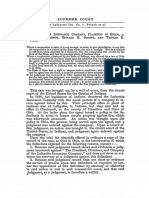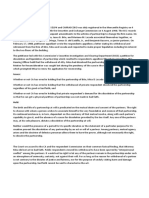Lim v. Philippine Fishing
Lim v. Philippine Fishing
Uploaded by
joyiveeongCopyright:
Available Formats
Lim v. Philippine Fishing
Lim v. Philippine Fishing
Uploaded by
joyiveeongCopyright
Available Formats
Share this document
Did you find this document useful?
Is this content inappropriate?
Copyright:
Available Formats
Lim v. Philippine Fishing
Lim v. Philippine Fishing
Uploaded by
joyiveeongCopyright:
Available Formats
Lim
v.
Philippine Fishing Gear Industries, Inc.
G.R. No. 136448
November 3, 1999
Facts:
On behalf of “Ocean Fishing Corporation” a contract for the purchase of fishing gears
was entered into by Chua and Yao who purported themselves to have been engaged in a
business venture with Lim Tong Lim with the Philippine Fishing Gear. Lim Tong Lim was not
however a signatory to the contract. The former failed to pay the contract.Philippine Fishing
Gear filed a collection case against Chua, Yao and Lim Tong Lim in their capacity as general
partners after SEC issued a certification that Ocean Fishing Corporation is a non-existent
corporation.Petitioner Lim, argued that he cannot be held liable under the doctrine of
corporation by estoppel since his name does not appear in the contract and that only Chua and
Yao should be held liable who dealt in the name of the ostensible corporation.
Issue: Whether or not petitioner is liable under the doctrine of corporation by estoppel?
Ruling: Yes.
Under the doctrine of corporation by estoppel, all persons who assume to act as a
corporation knowing it to be without authority to do so shall be liable as general partners for all
debts, liabilities and damages incurred or arising as a result thereof, provided, that, when any
such ostensible corporation is sued on any transaction entered by it as a corporation or on any
tort committed by it as such, it shall not be allowed to use as a defense its lack of corporate
personality. An unincorporated association, which represented itself to be a corporation, will be
estopped from denying its corporate capacity in a suit against it by a third person who relied in
good faith on such representation, and it cannot allege lack of personality to be sued to evade
its responsibility for a contract it entered into and by virtue of which it received advantages and
benefits. A third party who, knowing an association to be unincorporated, nonetheless treated
it as a corporation and received benefits from it, may be barred from denying its corporate
existence in a suit brought against the alleged corporation. In such case, all those who
benefited from the transaction made by the ostensible corporation, despite knowledge of its
legal defects, may be held liable for contracts they impliedly assented to or took advantage of.
In this case, technically, it is true that petitioner did not directly act on behalf of the
corporation, but having reaped the benefits of the contract entered into by persons withwhom
he previously had an existing relationship, he is deemed to be part of said association and is
covered by the scope of the doctrine of corporation by estoppel.
You might also like
- 1 Pioneer Insurance vs. CADocument1 page1 Pioneer Insurance vs. CAmotchie547100% (2)
- Lim Vs Philippine Fishing Gear - DigestDocument1 pageLim Vs Philippine Fishing Gear - DigestXing Keet LuNo ratings yet
- Olongapo v. SubicDocument1 pageOlongapo v. SubicjoyiveeongNo ratings yet
- Shailesh Black BookDocument57 pagesShailesh Black Bookshailesh prajapatiNo ratings yet
- 23 Lim Tong Lim, Petitioner, Vs - Philippine Fishing Gear Industries, IncDocument1 page23 Lim Tong Lim, Petitioner, Vs - Philippine Fishing Gear Industries, IncMaria Cristina MartinezNo ratings yet
- LIM TONG LIM Vs CADocument3 pagesLIM TONG LIM Vs CARoseannvalorie JaramillaNo ratings yet
- Case Digest - GR No. 136448, 1999-11-03Document3 pagesCase Digest - GR No. 136448, 1999-11-03Khalid Sharrif 0 Suma100% (1)
- Lim Vs Phil Fishing GearDocument2 pagesLim Vs Phil Fishing GearnilesrevillaNo ratings yet
- Lim Tong Lim vs. Philippine Fishing Gear Industries, Inc.: 728 Supreme Court Reports AnnotatedDocument15 pagesLim Tong Lim vs. Philippine Fishing Gear Industries, Inc.: 728 Supreme Court Reports AnnotatedAaron CariñoNo ratings yet
- Lim Tong Lim vs. Phil. FishingDocument3 pagesLim Tong Lim vs. Phil. FishingBorres JoshuaNo ratings yet
- Case Digest GR No 136448Document4 pagesCase Digest GR No 136448rachelprincess.monteroso23No ratings yet
- 2 DE LA ROSA, CamsDocument30 pages2 DE LA ROSA, CamsMiko TabandaNo ratings yet
- Lim Vs Philippine Fishing Gear IndustriesDocument23 pagesLim Vs Philippine Fishing Gear IndustriesGfor FirefoxonlyNo ratings yet
- ANTONIA TORRES, Assisted by Her Husband, ANGELO TORRES and EMETERIA BARING, Petitioners, COURT OF APPEALS and MANUEL TORRES, Respondents. FactsDocument4 pagesANTONIA TORRES, Assisted by Her Husband, ANGELO TORRES and EMETERIA BARING, Petitioners, COURT OF APPEALS and MANUEL TORRES, Respondents. FactsJohn Lloyd PerezNo ratings yet
- Lim Tong Lim vs. PH Fishing GearDocument3 pagesLim Tong Lim vs. PH Fishing GearNadaine100% (1)
- Lim Tong Lim v. Philippine Fishing Gear Industries, Inc., G.R. No. 136448Document14 pagesLim Tong Lim v. Philippine Fishing Gear Industries, Inc., G.R. No. 136448Krister VallenteNo ratings yet
- 1123203-1999-Lim Tong Lim v. Philippine Fishing Gear20160213-374-Tji4vwDocument14 pages1123203-1999-Lim Tong Lim v. Philippine Fishing Gear20160213-374-Tji4vwChristine Ang CaminadeNo ratings yet
- Digested Not CompleteDocument4 pagesDigested Not CompletespagyliciousNo ratings yet
- G.R. No. 136448 - Lim Tong Lim v. Philippine Fishing Gear Industries, Inc.Document15 pagesG.R. No. 136448 - Lim Tong Lim v. Philippine Fishing Gear Industries, Inc.LolersNo ratings yet
- Same Case From Batch 1 (Copied Digest)Document3 pagesSame Case From Batch 1 (Copied Digest)Tiff DizonNo ratings yet
- G.R. No. 136448. November 3, 1999. Lim Tong Lim, Petitioner, vs. Philippine Fishing Gear Industries, Inc., RespondentDocument10 pagesG.R. No. 136448. November 3, 1999. Lim Tong Lim, Petitioner, vs. Philippine Fishing Gear Industries, Inc., RespondentCriz BaligodNo ratings yet
- ATAP Case DigestDocument6 pagesATAP Case DigestMit SkroNo ratings yet
- Case DigestDocument43 pagesCase DigestJames Jake ParkerNo ratings yet
- Lim Tong Lim vs. Philippine Fishing Gear Industries, Inc.Document3 pagesLim Tong Lim vs. Philippine Fishing Gear Industries, Inc.zealous9carrotNo ratings yet
- 16 - Salvatierra v. GalvitosDocument2 pages16 - Salvatierra v. GalvitosNikki Emm100% (1)
- Realubit - Santiago Syjuco PORTRAITDocument12 pagesRealubit - Santiago Syjuco PORTRAITczarina annNo ratings yet
- Aurbach V Sanitary Wares Manufacturing Corporation G.R. No. 75875 December 15, 1989Document7 pagesAurbach V Sanitary Wares Manufacturing Corporation G.R. No. 75875 December 15, 1989Myla RodrigoNo ratings yet
- Lim Vs Phil Fishing GearDocument2 pagesLim Vs Phil Fishing GearJoshua Erik MadriaNo ratings yet
- Lim Tong Lim v. Philippine Fishing Gear Industries IncDocument2 pagesLim Tong Lim v. Philippine Fishing Gear Industries IncIhna Alyssa Marie SantosNo ratings yet
- What Constitutes Doing Business in The PhilippinesDocument3 pagesWhat Constitutes Doing Business in The PhilippinesVictoria EscobalNo ratings yet
- Corporation Law (3SS) - Case DigestsDocument75 pagesCorporation Law (3SS) - Case DigestsKenette Diane CantubaNo ratings yet
- Corpo and SRCDocument25 pagesCorpo and SRCmjpjoreNo ratings yet
- FPT - Case Digest Corpo (Riano)Document30 pagesFPT - Case Digest Corpo (Riano)Pamela DeniseNo ratings yet
- Lim Tong Lim Vs PfgilDocument1 pageLim Tong Lim Vs PfgilmenforeverNo ratings yet
- Mod1 - 8 - G.R. No. 136448 Long Tim V Phil Fishing - DigestDocument2 pagesMod1 - 8 - G.R. No. 136448 Long Tim V Phil Fishing - DigestOjie SantillanNo ratings yet
- LIM TONG LIM Vs Philippine Fishing Gear PDFDocument1 pageLIM TONG LIM Vs Philippine Fishing Gear PDFUE LawNo ratings yet
- Case No. 7 Vargas and Co. v. ChanDocument2 pagesCase No. 7 Vargas and Co. v. ChanMarian aNo ratings yet
- Lim Tong Lim v. Philippine Fishing Gear IndustriesDocument2 pagesLim Tong Lim v. Philippine Fishing Gear IndustriesFranzMordenoNo ratings yet
- 1 Lim Tong Lim vs. Philippine Fishing Gear Industries, Inc., G.R. No. 136448, November 3, 1999Document14 pages1 Lim Tong Lim vs. Philippine Fishing Gear Industries, Inc., G.R. No. 136448, November 3, 1999Francis Leo TianeroNo ratings yet
- 4 Lim Tong Lim v. PFGIDocument11 pages4 Lim Tong Lim v. PFGIKristine COrpuzNo ratings yet
- Corpo 5Document31 pagesCorpo 5karen mariz manaNo ratings yet
- Case Digests 1Document18 pagesCase Digests 1Yoan Baclig BuenoNo ratings yet
- Lim Tong Lim vs. Philippine Fishing Gear IndustriesDocument1 pageLim Tong Lim vs. Philippine Fishing Gear IndustriesValora France Miral AranasNo ratings yet
- Supreme Court: White Gold Marine Services, Inc. v. Bermuda G.R. No. 154514Document4 pagesSupreme Court: White Gold Marine Services, Inc. v. Bermuda G.R. No. 154514Jopan SJNo ratings yet
- Contract: The Lifetime of The Lease Would Be For A PeriodDocument4 pagesContract: The Lifetime of The Lease Would Be For A PeriodkriztelanncNo ratings yet
- ArticlesDocument5 pagesArticlesJazzmine Aclan PomadaNo ratings yet
- CASESDocument13 pagesCASESMaria Angelica LucesNo ratings yet
- Corporation DigestsDocument15 pagesCorporation DigestsDeneb BeeNo ratings yet
- Partnership Case DigestsDocument9 pagesPartnership Case DigestsJannus Mario Agbayani100% (1)
- Partnership CasesDocument25 pagesPartnership CasesCherry Castor QuijadaNo ratings yet
- Insurance DigestDocument7 pagesInsurance Digestellemig123No ratings yet
- Republic of The Philippines Vs Iglesia Ni Cristo (March 1984)Document5 pagesRepublic of The Philippines Vs Iglesia Ni Cristo (March 1984)Maria Cristina MartinezNo ratings yet
- Lim Tong Lim vs. Phil. Fishing Gear Industries, Inc., 317 SCRA 728Document8 pagesLim Tong Lim vs. Phil. Fishing Gear Industries, Inc., 317 SCRA 728andrew estimoNo ratings yet
- Seventh Day Adventist Conference Church of Southern Philippines, Inc. V. Northeastern Mindanao Mission of Seventh Day Adventist, IncDocument3 pagesSeventh Day Adventist Conference Church of Southern Philippines, Inc. V. Northeastern Mindanao Mission of Seventh Day Adventist, Incjobelle barcellanoNo ratings yet
- Cir vs. Suter FactsDocument12 pagesCir vs. Suter FactsEzi AngelesNo ratings yet
- Salvatierra V GarlitosDocument2 pagesSalvatierra V GarlitosLindsay Mills100% (2)
- Agency and Partnership Digests #9Document15 pagesAgency and Partnership Digests #9Janz SerranoNo ratings yet
- Darvin's - CorpDocument42 pagesDarvin's - CorpAirisa MolaerNo ratings yet
- ATP Week 10 DigestsDocument22 pagesATP Week 10 DigestsKre GLNo ratings yet
- Prima Facie EvidenceDocument12 pagesPrima Facie EvidenceAnonymous 3u8SzAk4No ratings yet
- A Simple Guide for Drafting of Conveyances in India : Forms of Conveyances and Instruments executed in the Indian sub-continent along with Notes and TipsFrom EverandA Simple Guide for Drafting of Conveyances in India : Forms of Conveyances and Instruments executed in the Indian sub-continent along with Notes and TipsNo ratings yet
- International Express Travel v. CADocument1 pageInternational Express Travel v. CAjoyiveeongNo ratings yet
- Manila Electric Company v. T.E.A.M. Electronics CorporationDocument1 pageManila Electric Company v. T.E.A.M. Electronics CorporationjoyiveeongNo ratings yet
- Kukan International v. ReyesDocument1 pageKukan International v. ReyesjoyiveeongNo ratings yet
- Prince Transport v. GarciaDocument1 pagePrince Transport v. GarciajoyiveeongNo ratings yet
- Gold Line Tours v. LasacaDocument1 pageGold Line Tours v. LasacajoyiveeongNo ratings yet
- Macasaet v. FranciscoDocument1 pageMacasaet v. FranciscojoyiveeongNo ratings yet
- Abad v. CommunicationsDocument1 pageAbad v. CommunicationsjoyiveeongNo ratings yet
- FVR Skills v. SEVDocument1 pageFVR Skills v. SEVjoyiveeongNo ratings yet
- Forest Hills Golf and Country ClubDocument1 pageForest Hills Golf and Country ClubjoyiveeongNo ratings yet
- Villamor v. UmaleDocument2 pagesVillamor v. Umalejoyiveeong100% (1)
- Arco Pulp and Paper Co v. LimDocument1 pageArco Pulp and Paper Co v. LimjoyiveeongNo ratings yet
- WPM International Trading, Inc. and Warlito P. Manlapaz v. Fe Corazon LabayenDocument1 pageWPM International Trading, Inc. and Warlito P. Manlapaz v. Fe Corazon LabayenjoyiveeongNo ratings yet
- Forest Hills Golf and Country ClubDocument1 pageForest Hills Golf and Country ClubjoyiveeongNo ratings yet
- Ching v. Subic BayDocument1 pageChing v. Subic BayjoyiveeongNo ratings yet
- Loadstar Shipping Company Inc. Et Al. v. Malayan Insurance CoDocument1 pageLoadstar Shipping Company Inc. Et Al. v. Malayan Insurance CojoyiveeongNo ratings yet
- Loadstar Shipping Company Inc. Et Al. v. Malayan Insurance Co.Document1 pageLoadstar Shipping Company Inc. Et Al. v. Malayan Insurance Co.joyiveeongNo ratings yet
- COC v. OIlink InternationalDocument1 pageCOC v. OIlink InternationaljoyiveeongNo ratings yet
- Foreign CorporationsDocument11 pagesForeign Corporationsjoyiveeong0% (1)
- Digests Rule 11-13 Rules of COurtDocument12 pagesDigests Rule 11-13 Rules of COurtjoyiveeongNo ratings yet
- Caseload 5 DigestsDocument11 pagesCaseload 5 DigestsjoyiveeongNo ratings yet
- Legal Opinion de MinimisDocument6 pagesLegal Opinion de MinimisjoyiveeongNo ratings yet
- Alvizo M3 Civil Procedure Caseassign Number 4Document18 pagesAlvizo M3 Civil Procedure Caseassign Number 4Pierre AlvizoNo ratings yet
- Content/Discussion Partnership Defined: Attributes of A PartnershipDocument30 pagesContent/Discussion Partnership Defined: Attributes of A PartnershipAnneShannenBambaDabuNo ratings yet
- AZUCENA v. TIU G.R. No. 203770 November 23, 2016Document2 pagesAZUCENA v. TIU G.R. No. 203770 November 23, 2016Vince Michael OngNo ratings yet
- 1120 & 1120s Corporation Tax Organizer - Long VersionDocument13 pages1120 & 1120s Corporation Tax Organizer - Long VersionExactCPANo ratings yet
- VOL. 787, MARCH 9, 2016 91: Republic vs. National Labor Relations Commission (Third Division)Document27 pagesVOL. 787, MARCH 9, 2016 91: Republic vs. National Labor Relations Commission (Third Division)IyahNo ratings yet
- PDF Corporations Financial Markets Law Redmond DownloadDocument53 pagesPDF Corporations Financial Markets Law Redmond Downloadcmahdedefo48No ratings yet
- Tubal Ensc 20133 Technopreneurship 101Document110 pagesTubal Ensc 20133 Technopreneurship 101randolf elmidoNo ratings yet
- 2nd Quarter Week 9 Forms of Business OwnershipDocument8 pages2nd Quarter Week 9 Forms of Business OwnershipRomnick SarmientoNo ratings yet
- Digest - Batangas Power vs. Batangas CityDocument2 pagesDigest - Batangas Power vs. Batangas CityPaul Vincent Cunanan100% (2)
- BLACKWATER SECURITY CONSULTING, LLC Et Al v. WESTCHESTER SURPLUS LINES INSURANCE COMPANY Et Al - Document No. 54Document1 pageBLACKWATER SECURITY CONSULTING, LLC Et Al v. WESTCHESTER SURPLUS LINES INSURANCE COMPANY Et Al - Document No. 54Justia.comNo ratings yet
- Kukan International Corporation vs. Hon. Amor Reyes, Et. Al.Document3 pagesKukan International Corporation vs. Hon. Amor Reyes, Et. Al.Austine Clarese VelascoNo ratings yet
- Uy vs. Siy Cong Bieng, Et Al, 30 Phil. 577 (1915) - G.R. No.l-8646Document4 pagesUy vs. Siy Cong Bieng, Et Al, 30 Phil. 577 (1915) - G.R. No.l-8646AM CruzNo ratings yet
- Understanding Culture, Society, and PoliticsDocument5 pagesUnderstanding Culture, Society, and Politicsriza amoresNo ratings yet
- Accounting Principles: Corporations: Organization and Capital Stock TransactionsDocument58 pagesAccounting Principles: Corporations: Organization and Capital Stock TransactionsThế Vinh100% (1)
- I. Agreement: HE Following Are The Points Are The Points of Difference Between Partnership and Co-OwnershipDocument3 pagesI. Agreement: HE Following Are The Points Are The Points of Difference Between Partnership and Co-OwnershipOsama Abdur RahimNo ratings yet
- Commercial Law Review Case Digests RVP RCC 1Document58 pagesCommercial Law Review Case Digests RVP RCC 1Carmii HoNo ratings yet
- Lafayette v. FrenchDocument6 pagesLafayette v. FrenchbenratzingNo ratings yet
- Hariharan PDFDocument10 pagesHariharan PDFHariharan ShekarNo ratings yet
- Chapter - 1: A Study On Recruitment & SelectionDocument64 pagesChapter - 1: A Study On Recruitment & SelectionSunil RAYALASEEMA GRAPHICSNo ratings yet
- G.R. No. 188269 - Sumifru (Philippines) Corp. VDocument9 pagesG.R. No. 188269 - Sumifru (Philippines) Corp. VLien PatrickNo ratings yet
- Partnership Case DigestsDocument7 pagesPartnership Case DigestsRamon T. Conducto IINo ratings yet
- ISC Class 11 Commerce Syllabus 2023 24Document4 pagesISC Class 11 Commerce Syllabus 2023 24Piyush BishtNo ratings yet
- Commission On Audit 1Document15 pagesCommission On Audit 1Eugene DayanNo ratings yet
- Ba 162: Partnerships and Corporations January 28, 2014Document2 pagesBa 162: Partnerships and Corporations January 28, 2014hikarukauroNo ratings yet
- VALLE VERDE COUNTRY CLUB INC. vs. VICTOR AFRICADocument3 pagesVALLE VERDE COUNTRY CLUB INC. vs. VICTOR AFRICARal CaldiNo ratings yet
- Ba 224. Chapter 1Document25 pagesBa 224. Chapter 1Reynadith VilladelgadoNo ratings yet
- Chart On Corporate Structures: Sole Proprietorship, General Partnership, Limited PartnershipDocument11 pagesChart On Corporate Structures: Sole Proprietorship, General Partnership, Limited PartnershipDevorah Gillian100% (2)
- Case DigestDocument10 pagesCase DigestKaiserNo ratings yet
- Commercial LawDocument6 pagesCommercial Lawrunish venganzaNo ratings yet
